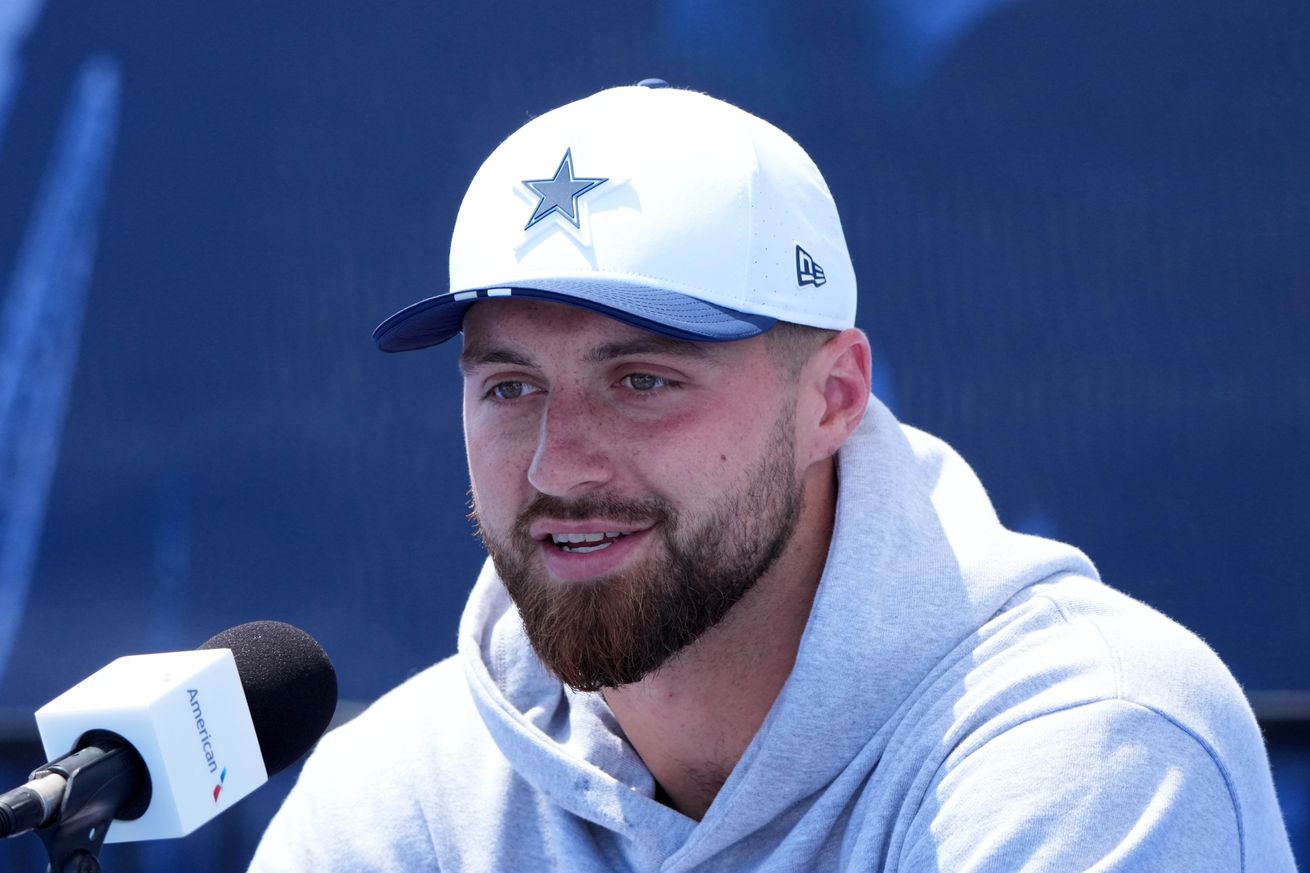
It is still wild that Jake Ferguson was the FIRST extension done at training camp.
On Sunday, the Cowboys signed one of their players to a big contract, but not the one we were expecting. Jake Ferguson, who was entering the final year of his rookie deal, signed a four-year deal worth $52 million, making him the sixth-highest paid tight end in the league.
4 more Cowboys Nation! Let’s work pic.twitter.com/747ap0EOVk
— Jake Ferguson (@jqfergy11) July 28, 2025
The move came as a little bit of a surprise for a few reasons. For starters, the Cowboys have a lot of impending free agents after this season, with nine expected starters set to play on their final year of their current contract. The biggest name, by far, is Micah Parsons; beyond him, though, are DaRon Bland, Donovan Wilson, Dante Fowler, Brandon Aubrey, and George Pickens, to name a few.
There’s also Tyler Smith, who has his fifth-year option in place for the 2026 season but who has been publicly identified as a target for an extension by Stephen Jones.
Simply put, and with all due respect to Ferguson, nobody expected him to be the first one out of that bunch to ink an extension. Especially after Jerry and Stephen Jones made comments at the onset of training camp this year about why they’re so content to drag out contract negotiations, even expressing regret over early extensions for the likes of Trevon Diggs and Terence Steele.
Of course, the Cowboys haven’t been completely against early extensions, but it typically happens when they get a player to agree to a really team-friendly deal. Tyron Smith’s first extension comes to mind, for example.
Ferguson’s deal, while not market-resetting, isn’t exactly team friendly though. He has $30 million in guaranteed money, which puts him fifth among all tight ends, just behind Mark Andrews and Trey McBride. The Cowboys have good reason to like what Ferguson brings to the table, but his production doesn’t exactly suggest he’s on the same level as those two.
Going into his fourth season in the NFL, Ferguson’s résumé is hard to evaluate. He hardly saw the field as a rookie, but was elevated into a starting role the next year. His 761 yards and five touchdowns that year earned him a Pro Bowl nod, and he finished in the top 10 among tight ends in catches, yards, touchdowns, yards after the catch, and yards per route run.
Last year, though, was extremely disappointing for Ferguson. He had just 494 receiving yards and, for the first time as a college or pro player, failed to score a single time. He also fumbled four times and drew the second-most penalties on the team. He missed three games with injuries, which impacted his performance to some degree, but Ferguson didn’t look like himself even when healthy.
Compare to that to Parsons and Bland, both of whom have played at an All Pro level every year of their career thus far, and it’s understandable why some felt Ferguson needed a big year to justify a contract like this.
In that regard, it feels a little reminiscent of Jaylon Smith’s contract extension when the front office was engaged in their very first bout of negotiations with Dak Prescott. Smith’s deal came as a bit of a surprise, and during a press conference regarding the deal, Jerry Jones made several comments that were perceived as not-so-subtle jabs at Prescott’s camp.
A few years later, when they were once again negotiating with Prescott, we got those aforementioned extensions for both Diggs and Steele.
Prescott is now signed, obviously, but Parsons is the new big fish they’re taking their sweet time reeling in. And it seems as if they’ve played a familiar card with their move to extend Ferguson much earlier than expected, maybe hoping to somehow spur a cheaper deal from their bigger fish.
Of course, that didn’t work either time with Prescott, as he got paid top-of-market money both times. Meanwhile, Smith didn’t even play two full seasons on that new deal, as injuries continued to set him back on the field. And while both Diggs and Steele are still in town, Jones all but said it was a mistake last week.
To be clear, this has little to do with Ferguson. The energy and intensity he brings to the locker room certainly adds value beyond his numbers, but that doesn’t erase the risk that’s inherent in pursuing a strategy that’s seemingly backfired twice already for the Cowboys.